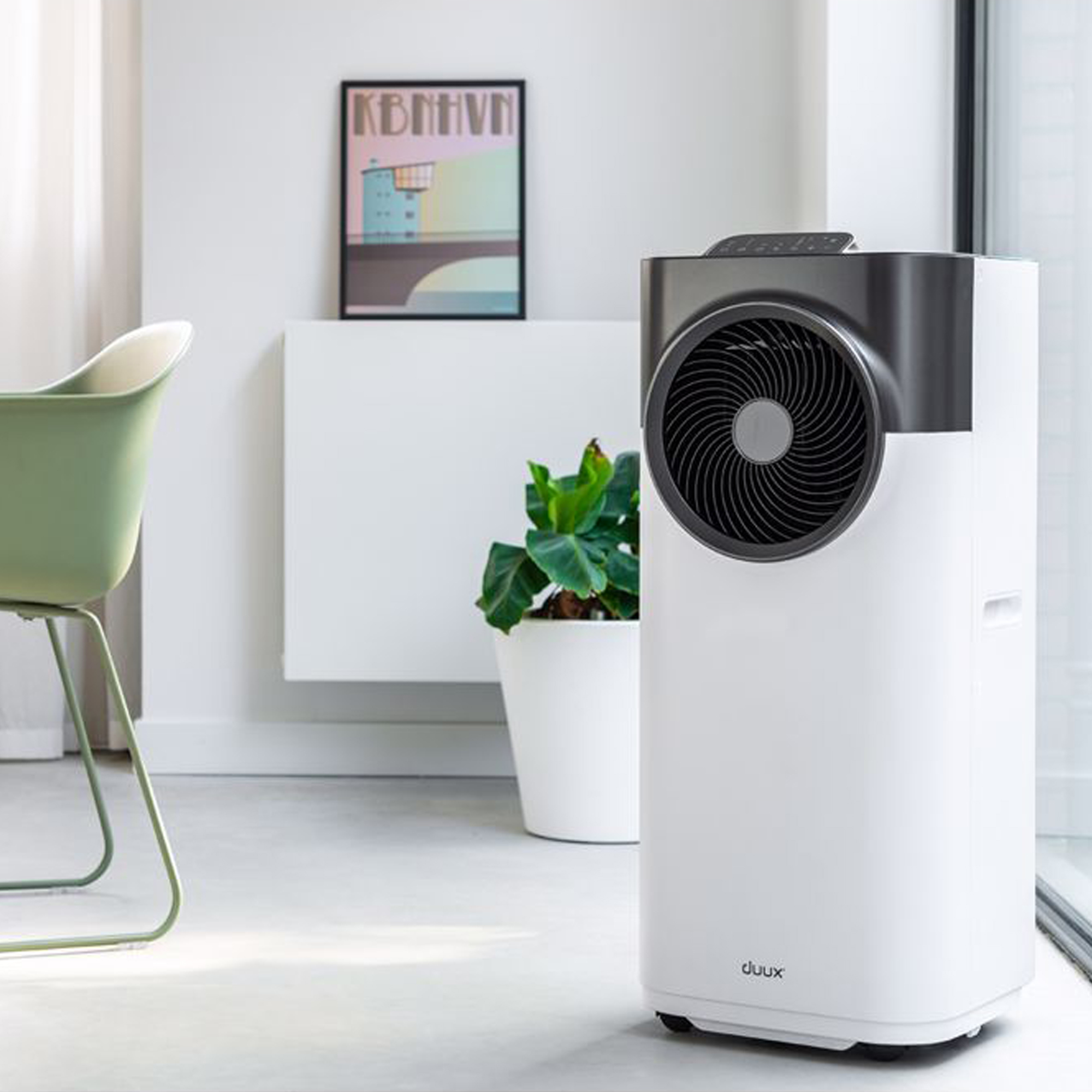
1. What is an air conditioner
2. What is an air cooler
3. Cooling power
4. Affordability
5. Running costs
6. Noise levels
7. Most portable
8. Final verdict
If you’re keen to keep cool in the heat then you may be wondering what the difference is between an air conditioner vs air cooler.
Both indoor appliances claim to cool you down fast, but there are some key distinctions between the two, including how they work and the results they achieve.
I've put a number of the best portable air conditioners through their paces to find those that are cream of the crop and also tested out some bestselling air coolers to compare performance.
Using this practical hands-on experience combined with insight from the experts, I’ve broken down the difference between air conditioners vs air coolers to help you make the right decision for you and your home, including how they compare in terms of ease of use, performance, and, of course, cost.
Air conditioner vs. air cooler
What is a portable air conditioner and how does it work?
A portable air conditioner is a type of cooling device that's freestanding and able to be moved around the home to cool down a room. They're usually fairly large and require access to a power socket, plus they need to be positioned near a window so that the heat they've extracted from the air inside the room can be vented outside via a hose.
A portable air conditioner works by using a fan to pull air into the unit and across condenser coils filled with refrigerant that cool the air. It then blows the cooled air back into the room, whilst the heat is vented outside through a window.
Nick Kandola of the AirConCentre, an air conditioner buyer with fifteen years of experience in the world of indoor cooling, explains further, ‘Portable air conditioners are powerful units that can be used to cool a room or space in the home.'
'Unlike traditional split air conditioning units which are permanently installed fixtures, portable air conditioners are self-contained, freestanding units that can easily be moved between rooms without any type of permanent installation required,' explains Nick. 'You’ll just need to use a ducting hose, which is often supplied with the unit, to vent the unwanted hot air out of a window'.
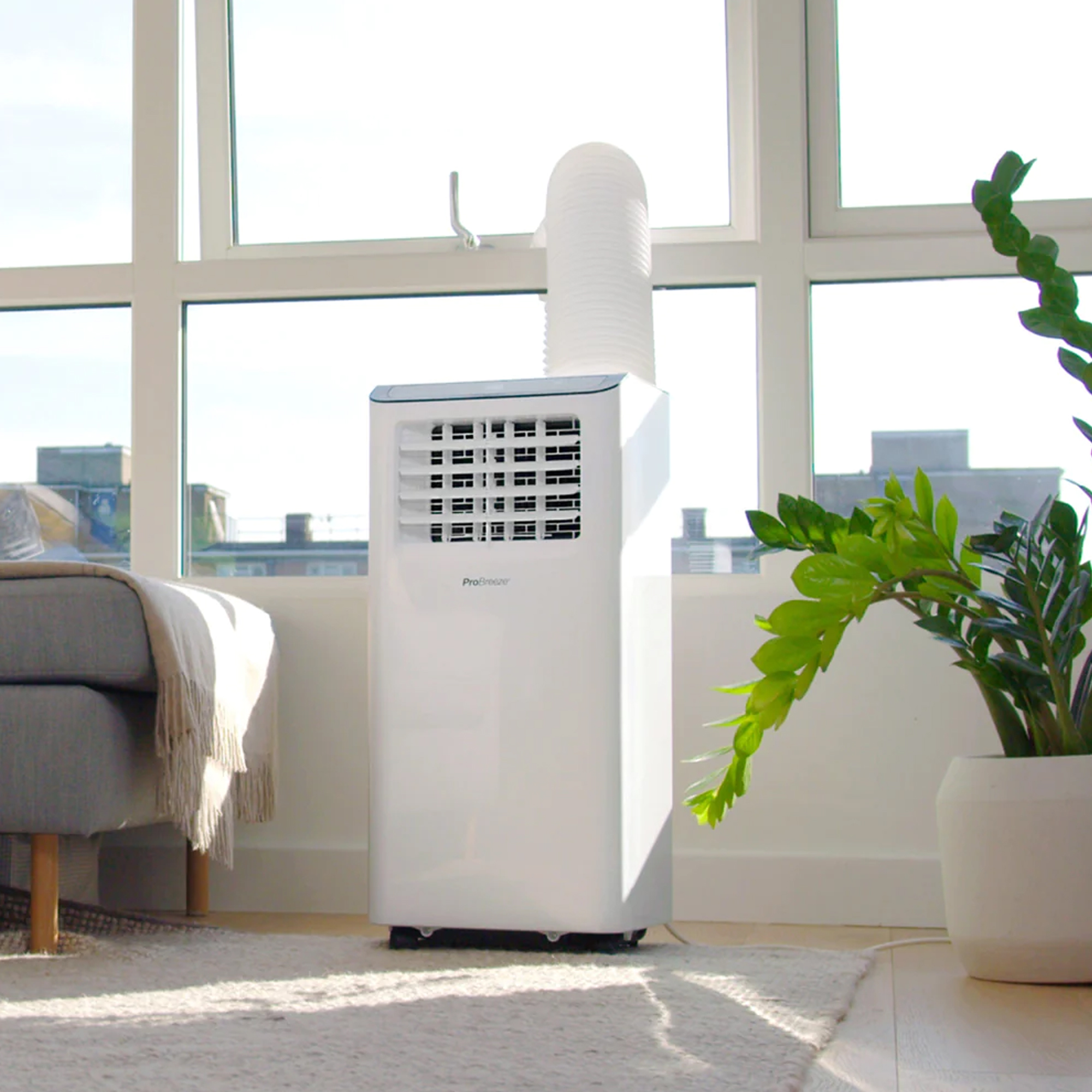
Air conditioner pros
‘In addition to portability, what makes portable air conditioners so popular is that they are incredibly effective at cooling when compared to other options such as fans or air coolers,' says air conditioner expert Nick. 'That's because they're the only option to draw in warm air and use refrigerant to cool it.’
In my experience testing air conditioners, such as the Russell Hobbs RHPAC11001 Portable Air Conditioner and MeacoCool MC Series 7000BTU Portable Air Conditioner, a portable air conditioner is very impressive at reducing the temperature in the room. Both the units I tested were able to bring the ambient room temperature down by approximately two degrees Celsius in a super speedy ten minutes.
Air conditioner cons
That said, there are downsides that come hand-in-hand with a portable air conditioner's impressive performance.
Firstly, a portable air conditioner is usually expensive, with most models of decent power costing between £300 and £1000. They're also not quite as portable as their name might suggest, with most options capable of cooling an average-sized room weighing in around 20kg, and often far more. And, they can be noisy, with most units operating at above 50dB of noise, so if you're a light sleeper then a portable air conditioner may not be the best way to cool down a bedroom.
You'll also need to factor in somewhere to vent all the hot air that the unit is extracting. A portable air conditioner needs a ducting hose to vent the hot air out of the window, as well as a window kit to seal the window so hot air can't get back in. This might be provided with the unit you buy, or need to be bought separately.
There is a good selection of portable air conditioner window venting kits on Amazon, but it's an additional expense to factor in, plus fitting the window kit can be fiddly. Once the kit is on, it can stay in place for as long as you want to use it, but moving the portable air conditioner from one room to another will mean the window kit needs to be moved too. And, as our GoodHome Malay 9000BTU air conditioner review revealed, often window kits aren't one-size-fits-all.
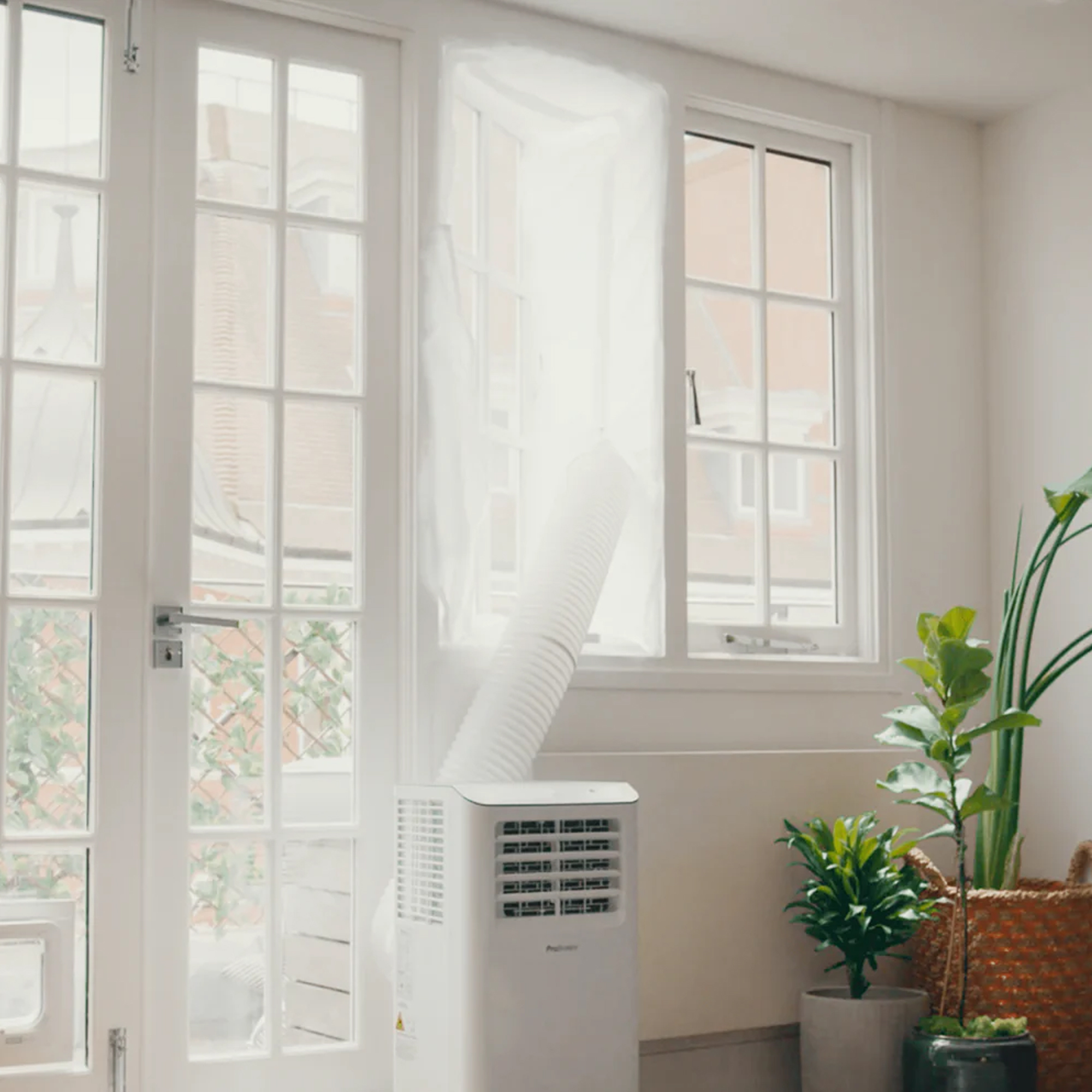
What is an air cooler and how does it work?
An air cooler is a smaller appliance that is somewhat of a cross between an air conditioner and a fan. An air cooler utilises evaporative cooling to reduce the temperature and is generally comprised of three main components; a water tank, an absorbent sheet or filter, and a fan.
The air cooler pulls in hot air with the fan and draws it over the absorbent sheet or wet filter which is kept hydrated by a water reservoir inside the unit. It then expels this cooler, moisture-laden air back into the room once more. Technically, an air cooler works in a similar way to placing a bowl of cold water or ice in front of one of the best fans.
Chris Michael, Managing Director of air quality appliance manufacturer Meaco, explains, ‘Air coolers are regularly mentioned alongside portable air conditioners, but they are very different machines, built for different environments. An air cooler has a water tank to soak a filter material. Air is passed over the filter and then cooler humid air is pushed into the room.’
'Air coolers draw water from a reservoir stored within them,' adds Nick from the AirConCentre. 'The hot air is drawn in and passes over the water, the water evaporates into the air to lower the temperature. The principle is the same as how your skin cools after stepping out of the shower'.
Air cooler pros
The main pro of an air cooler is that they're generally a far more affordable choice than a portable air conditioner, ranging from around £50 to £200. They're also generally much more compact, and therefore far more portable.
An air cooler is also quick and easy to set up and use. You don’t have to spend time attaching exhaust ducts and window kits as you do with a portable air conditioner, instead, most air coolers just need to be filled with water and turned on.
‘Air coolers are typically cheaper (usually under £100) and don’t require a duct to push hot air out of the window,' agrees Chris from Meaco.
Air cooler cons
There had to be a downside though right? And sadly that downside is cooling power.
'An air cooler has a water tank which soaks a filter material,' explains Chris from Meaco. 'Air is sucked in and passed over the filter, then cooler humid air is pushed into the room. As such, these machines work best in arid countries but are not very effective in Britain, where we have humid summers.'
'Whilst an air cooler typically costs less money than a portable air conditioner, they are much less effective than portable air conditioners at cooling a space and require regular refilling of their reservoirs,' agrees Nick from the AirConCentre. 'For most people, the best way to stay cool in the home is usually with the convenience and power of a portable air conditioner.’
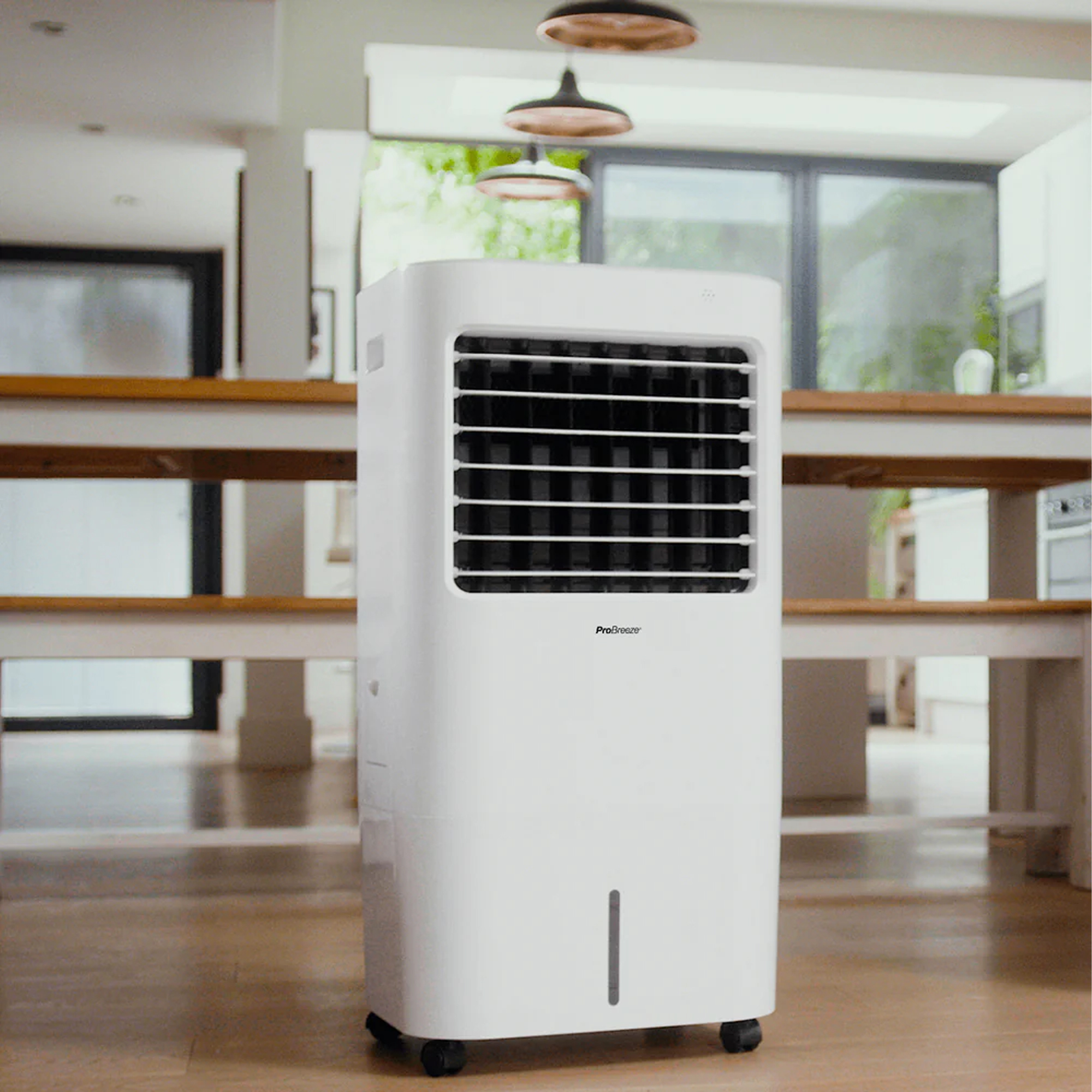
Which cools a room down quicker, an air conditioner or an air cooler?
It's probably becoming clear by now, but if you're looking for the best cooling performance, then a portable air conditioner will generally beat an air cooler hands down.
However, it does depend on what type of cooling you're looking for. In my tests, I found that an air cooler was effective at delivering a cool blast of air in a more localised place, e.g. if you had it pointed directly at you whilst you were sat a desk. Whereas an air conditioner is far more effective at lowering the temperature of a whole room.
If your house has turned into a sauna during a heatwave, it's only a portable air conditioner that is going to be able to extract that heat and reduce the temperature down to a chilly 'fridge' like feel.
'A properly sized air conditioner can effectively cool down a room within 30 minutes, reducing the temperature by several degrees,' says Nick from the AirConCentre. 'However, if you require a more significant and rapid cooling effect, it may take a few hours to achieve the desired result'.
'Air coolers will only really cool a room down by 2–3 degrees within a couple of hours if used correctly (i.e. the room is not too humid and windows/doors are kept open for a flow of air), they are more designed to cool a person down rather than a space, with an air cooler creating a cool sea breeze effect on your skin.’
Which is more affordable to buy, an air conditioner or an air cooler?
‘The price range for portable air conditioners is £300—£1,000, while air coolers range from £100—£400 per unit,' explains Nick from the AirConCentre.
So an air cooler is the cheaper upfront investment, however, Nick goes on to say, 'It's important to note that air coolers will have limited cooling capacity, don’t work effectively in humid environments, and may not be suitable for larger rooms.'
'In such cases, air coolers can be used as ‘spot coolers’ or multiple units may be required, which could incur higher costs compared to a single portable air conditioner.’
Jake Crossley from Appliances Direct agrees. ‘Air coolers tend to always be the most affordable, mainly because they are not as powerful as an air conditioning unit and do not have the same capabilities.'
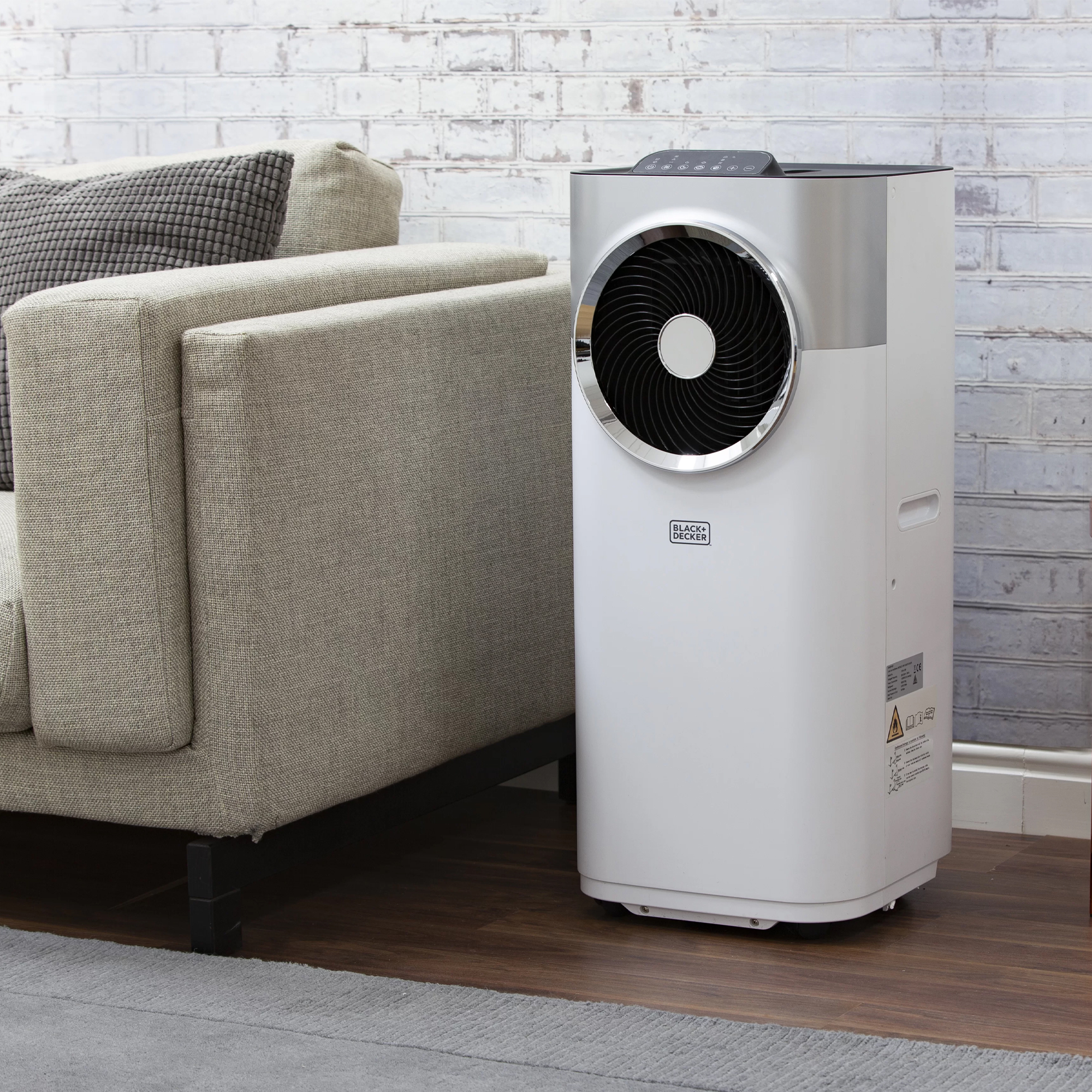
Which is cheaper to run, an air conditioner or an air cooler?
‘Air coolers are the more cost-effective option when it comes to running expenses,' advises Nick from the AirConCentre.
'For portable air conditioners, let’s say we are going to use a 9000 BTU unit (a typical mid-size unit), 6 hours daily for a month. Such a unit typically consumes 1000 watts (W), equivalent to 1 kilowatt (kW). This means your unit will consume 6 kW per day. Based on current energy prices, this would cost £1.80 per day, amounting to £54.00 per month'.
'Now for air coolers, let's take a typical 10L air cooler as an example, with the same usage of 6 hours daily for a month,' continues Nick. 'The power consumption would be 120 watts (W), or 0.12 kilowatts (kW). Daily usage would amount to 0.72 kW, costing you 22p per day and £6.60 per month'.
'It is important to note that even though both units were used for the same 6-hour duration, the results are vastly different. As mentioned earlier, while air coolers are more economical, they do not provide the same level of cooling as air conditioners.’
Which is the quietest, an air conditioner or an air cooler?
My experience of testing air conditioners vs air coolers was that air coolers were quieter. Whilst my children objected to having an air conditioner in their room because of the noise, both loved an air cooler for delivering localised cooling quietly!
AirConCentre’s Nick Kandola explains why this is. ‘Typically, air coolers are quieter compared to air conditioners due to the absence of a compressor, which is the main source of noise,' he says.
'Air coolers usually produce a noise level of around 40–48 decibels (dB). On the other hand, portable air conditioners tend to generate a noise level ranging from 54–65 decibels (dB), which is equivalent to the sound produced by a microwave.’
Which is more portable, an air conditioner or an air cooler?
Usually, both portable air conditioners and air coolers come with castors on their base to make them easier to move around the home. However, overall I found an air cooler to be far more portable, as they're generally smaller, lighter, and you aren't as limited in placement.
A portable air conditioner also needs to be placed close to a window so that you can vent the hot air hose outside to extract the heat, whereas an air cooler doesn't have this requirement, instead venting the air back into the room.
‘Portability all depends on the size and power of the unit, some air coolers can be larger than some more portable air con units, but more likely than not, an air cooler is more portable, as air con units are usually heavier and come with the ducting pipe kit,' notes Appliances Direct’s Jake.

Air conditioner vs. air cooler – which should you buy?
The final verdict
So which is the winner in the portable air conditioner vs. air cooler debate?
Well, if you're looking for optimum cooling performance – and most of us are weighing up the difference between an air conditioner vs. air cooler because we want to get cool, fast – then in our minds, there's a clear winner. A portable air conditioner is going to cool your home down the quickest, and the most effectively.
A portable air conditioner is the only option that uses refrigerant to actively reduce the temperature in a room and that can then maintain your desired house temperature. All other options, whether that's a fan or an air cooler, work by creating a cooling sensation when directed at a person, rather than creating a cooler climate in the house as a whole.
However, opting for a portable air conditioner will mean investing a significant sum upfront and factoring in more expensive running costs. A portable air conditioner is also bigger, bulkier, heavier, harder to move, and more awkward to store than an air cooler, plus you're limited in positioning as you'll need a window kit to seal a window and vent the extraction hose through it.
In general, a portable air conditioner is also noisier than an air cooler because of its compressor unit which aids the refrigerant in cooling the room.
If, instead, you're happy to settle for more localised cooling, and just want a refreshingly cool blast of air directed towards you when you’re laying in bed at night or working at a desk, then an air cooler can do the job and costs far less, both upfront and in terms of running costs. An air cooler is also more portable, more compact and easier to store, and generally quieter to operate.
Ultimately, whether you opt for the expense but superior cooling powers of a portable air conditioner, or the ease of use and affordability that an air cooler offers, both will help you to keep your cool in a heatwave. It just depends on how much heat you can handle.







